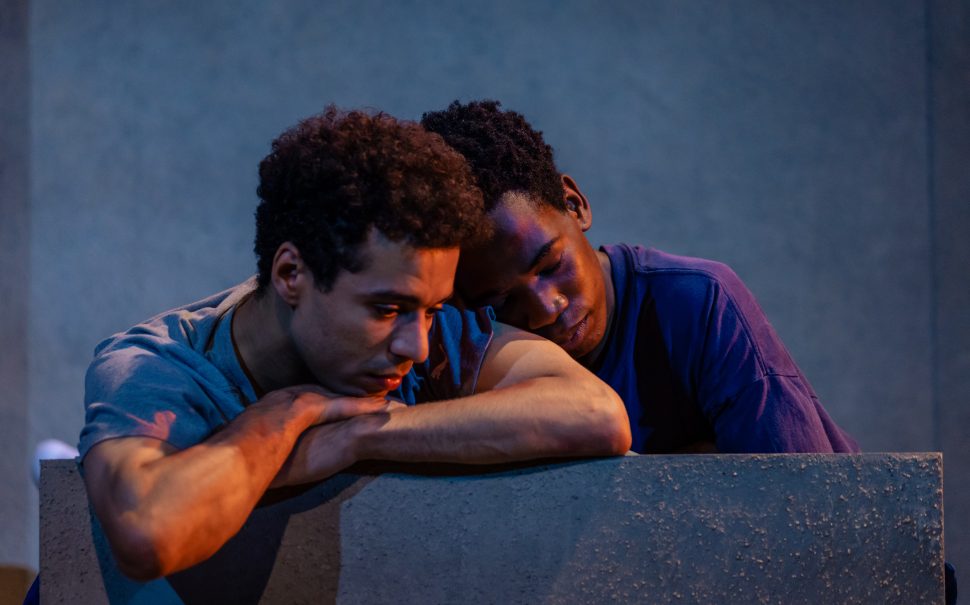Home Manchester’s Beautiful Thing is a feelgood, heartwarming production with community and acceptance at its core – but it’s also not afraid to tackle some dark issues, from domestic violence and alcoholism to homophobia and societal judgement.
Jonathan Harvey’s play, revived by Anthony Simpson-Pike here for its 30th anniversary, follows the inhabitants of a working-class area of East London. It centres around bullied, lonely Jamie, who is infatuated with sporty, popular classmate Ste.
The boys slowly begin a relationship when Ste flees his abusive father and takes refuge in Jamie and mum Sandra’s house, discovering and learning to accept their sexuality.
A co-production with Theatre Royal Stratford East and Leeds Playhouse, it’s a play about being an outsider, but also about the fierce bonds of family and community, and finding love in the face of adversity. Harvey’s play was published when Section 28 was still in force and at the height of the AIDS crisis.
But it’s also very funny. Despite its dark subtext the play is a brash comedy, which sometimes sits uncomfortably alongside its frequent moments of emotional drama and occasional violence – yet it is powerful in its insistence on optimism and overcoming heartache.
Jamie (Rilwan Abiola Owokoniran) is an immediately likeable character with an unexpectedly steely edge, particularly in confrontations with Sandra as he wrestles with his sexuality. Watching him become more comfortable in himself and with Ste as the play progresses is a particularly powerful moment for the audience.
Ste is a bubbly, friendly soul whose inner conflicts are played very effectively by Raphael Akuwudike, particularly his sharp transitions to anger over his abusive family situation and fear of being exposed.
The attention to detail in characterisation is fantastic. Small moments like seeing Ste quietly close his front door to avoid angering his father, compared with all the others freely slamming theirs, bring an extra level of depth and realism to the play.
The relationship between the two boys, filled with moments of teenage awkwardness and tension, hits just the right note of tenderness.
Shvorne Marks is brilliant as protective, spirited Sandra, confident and bullish as she rules the roost over this small community, but also sweet – in her own way – with her son.
Scarlett Rayner is a magnetic presence as flirtatious, gossipy but deeply vulnerable girl-next-door Leah. Her relationship with Sandra, her long-suffering neighbour, is played particularly well, from the play’s opening exchange: “Alright, Sandra?”
“SLAAAAG!”
Trieve Blackwood-Cambridge as Sandra’s new boyfriend Tony provides great comic relief, awkwardly fist-bumping the boys and trying – a little misguidedly – to bond with Jamie by giving him a football.
The characters are loud, colourful people and the production is filled with music, from Leah’s Mama Cass renditions to the blaring stereo as the play begins. But it also knows when to use silence to great effect, especially in early moments of awkwardness as the boys begin to develop feelings for each other.
Rosie Elnile’s stripped-back set – the three front doors of the adjoining flats on a run-down council estate – is simple but effective, and the impact when it opens up to reveal a glitzy nightclub at the end is suitably magical.
Lighting by Elliot Griggs underscores the warmth at the play’s heart, with muted shades of pink, orange and blue in the transitions between scenes. The intimate setting of HOME also feels well-suited to the production’s domestic drama.
Some moments – particularly in the second act – felt a little too saccharine considering the play’s hard-hitting material on abuse and homophobia, which largely feels forgotten about by curtain close. The transitions between these darker moments, such as onstage violence between Jamie and Sandra, and others of raucous comedy were sometimes a little jarring, too.
But overall the play is a triumph, with brilliantly pitched characters and loving, complex relationships between them all providing real heart to this production.
Tickets are available here; the production will be at Home Manchester until Saturday 11 November.
Featured image: The Other Richard.



